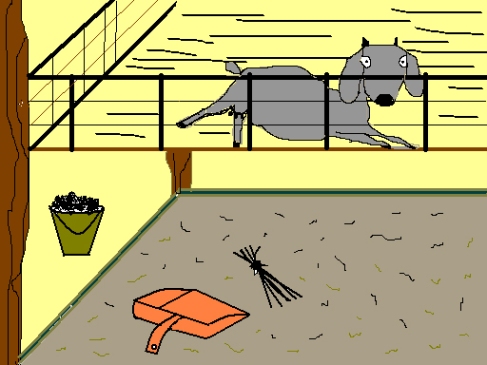MY DAYS WITH GOATS part 2
Inter faeces et urinam nascimur omnes(all are born into the midst of faeces and urine), said St.Augustine of Hippo while he was still a Manichaean and was skeptical about the goodness of created world. He believed, like any other Manichaean that there exists a positive entity which is evil. Later the Scholastic philosophers would furnish the definition that evil is privatio boni(absence of goodness), which makes it a relative or negative entity. One may still contend that a negative entity is still an entity and has existence as such; even I am inclined to believe so. Hopefully these static definitions of good and evil are improved upon by contemporary dynamic theodicy, drawing largely from the theodicy of St.Irenaeus, which was hitherto run over by Augustinian theodicy. By theodicy (a term coined by Leibniz) we originally understand the philosophical attempt to justify God despite the innumerable arguments pitched against Him, the greatest of which is the so-called problem of evil. We speak of it as a problem to shift the onus on some external factor, even when evil is an operation towards which each of us contributes a lot. It is more truthful to call it a mystery rather than a problem. A mystery is something in which one is inextricably involved. It is in the setting of a mystery that one draws the essential life-force to describe oneself; when everything is clear, life comes to a standstill- there will be no differences of opinion or that diversity what makes the world livable. We would be like automata programmed to “receive” with no options for check-out (remember Hotel California, just before the guitar begins its final weep.)
So was I literally in the midst of faeces and urine, not a very detestable experience. A goat’s excreta are, as I noted earlier, much enriched and not very distressing to the senses. As a matter of fact I have thought of and often sought an answer to the wonder that a goat’s dropping is showered down as a rain of globules. What contraption in its guts could be responsible for this natural work of art? Forgive my naivety. Somebody commented that God must be a civil engineer for having placed a fun park very next to a sewer. There are design constraints, but what about the economy of design which ensures that same organs are sourced from radically different reservoirs to serve even more radically different ends. It takes a real genius to contrive such a multiplex. There exists a “humiliatory system” in our loins which one may conveniently call the urino-genital and the gastro-intestinal system depending on one’s erudition. What I know for sure is that the four-letter words in many Indian languages derive their striking power by their reference to a part in the loin in an obscene light. The loin is a juxtaposition of our call to perpetuity (by its signification of generative functions) and temporality (gastronomic and scatological concerns are sure indicators of our existential exigencies.) The goats were sheltered on a raised platform of areca planks with banisters around, something like a makeshift stage. A volleyball game was underway and we could hear the distress call of a goat from that distance and a brother was sent to see. He came back with a report that it was nothing but a case of “stage fright.”
What really pertains to this discussion is the dirty underbelly of the goat pen. One could hardly stand erect under it. The only movements possible under it were either on all fours or some other exertions employing your legs alone if you had stronger calves, but be sure that sooner or later you would fall on all fours if not already so. Had it been just a cemented floor, one would not be too much concerned about “all fours” or “toe tips” or just any other configuration. It was there I pondered on the verity of that Augustinian maxim faced with the concreteness of the experience. The cemented floor underneath the pen was, yes you guessed it, bottom-line for that sea of urine with its innumerable floats and sunken junks of those aesthetically perfect ovine droppings and you are armed with a trimmed broom and a leaky dustpan to fill up an equally leaky bucket. Well, that is the only unaesthetic side of the whole setting. Developing a taste for routine is a vital part of almost all monastic traditions. Employing seemingly unrewarding exercises and adopting those ways by which the whole performance of an operation can sound cumbersome and irrational are efficient techniques in inculcating this value. Often I have wondered whether many conspicuous faults in the schemes of work are deliberately introduced or are made out of the naivety of the monks who proposed them. There ought to be some wisdom absconding in these practices.


No comments:
Post a Comment